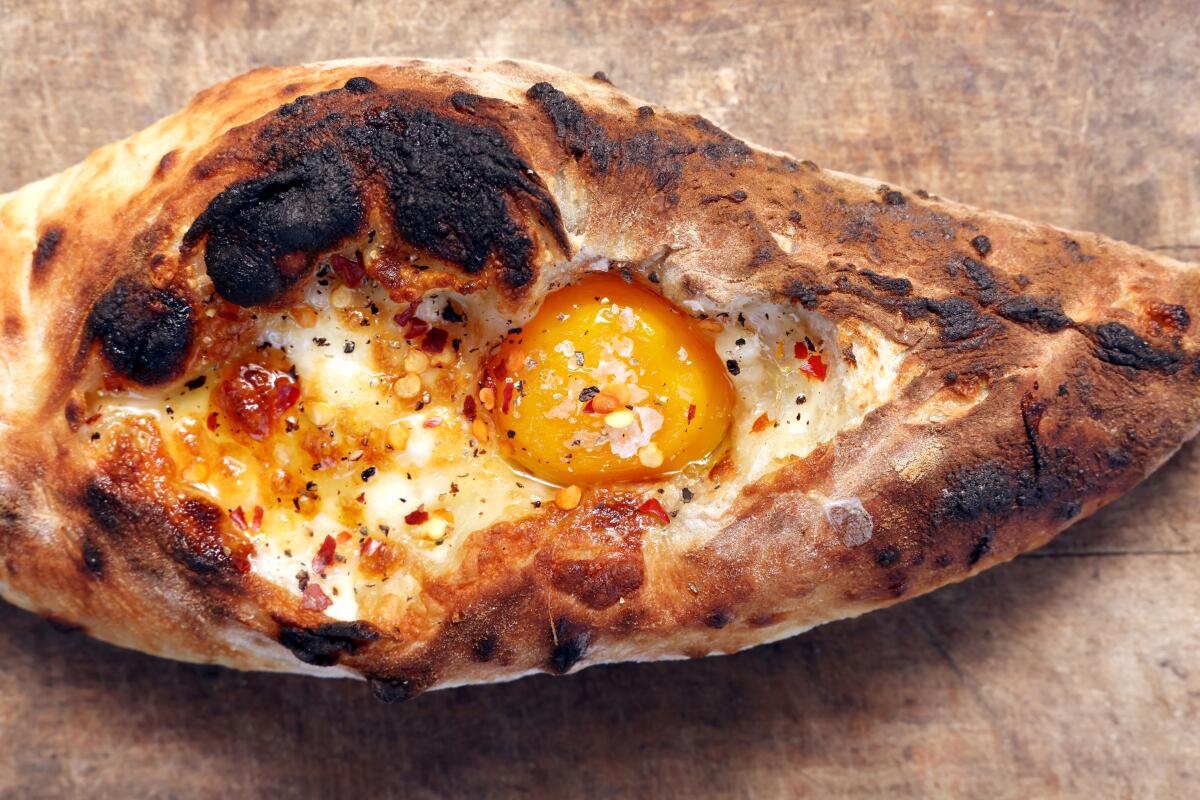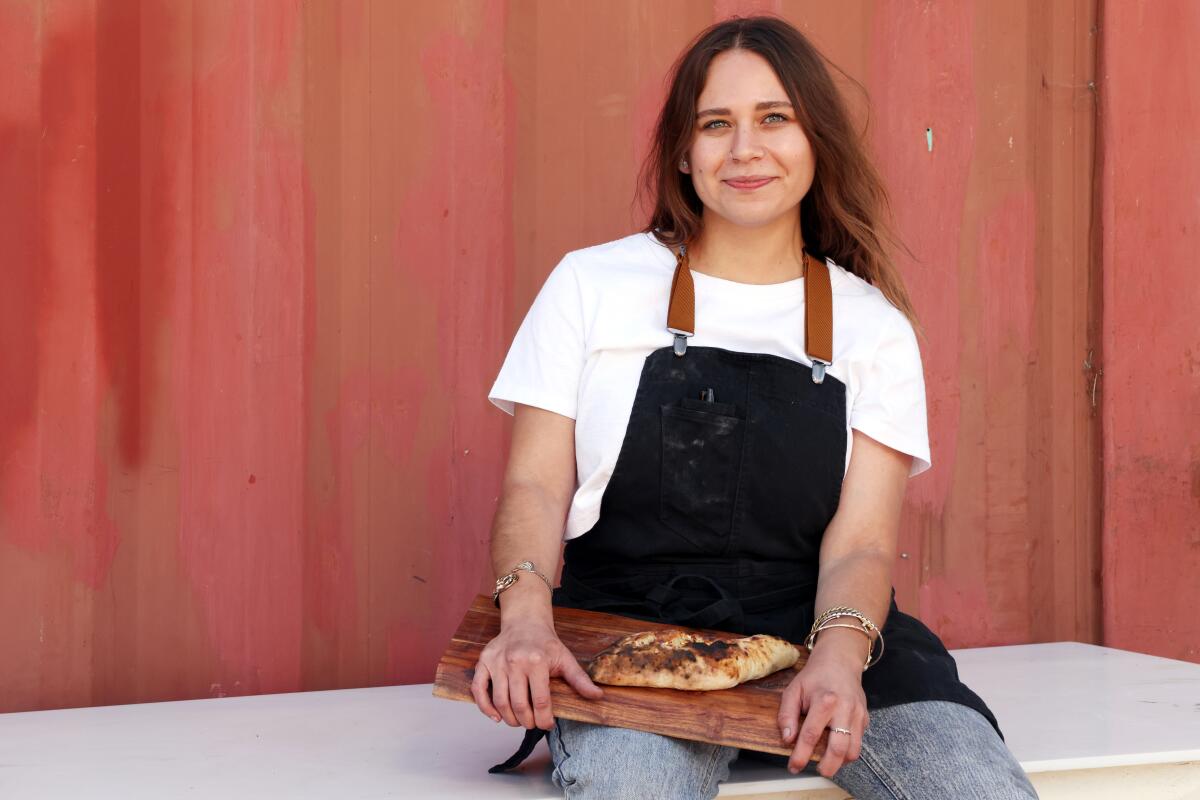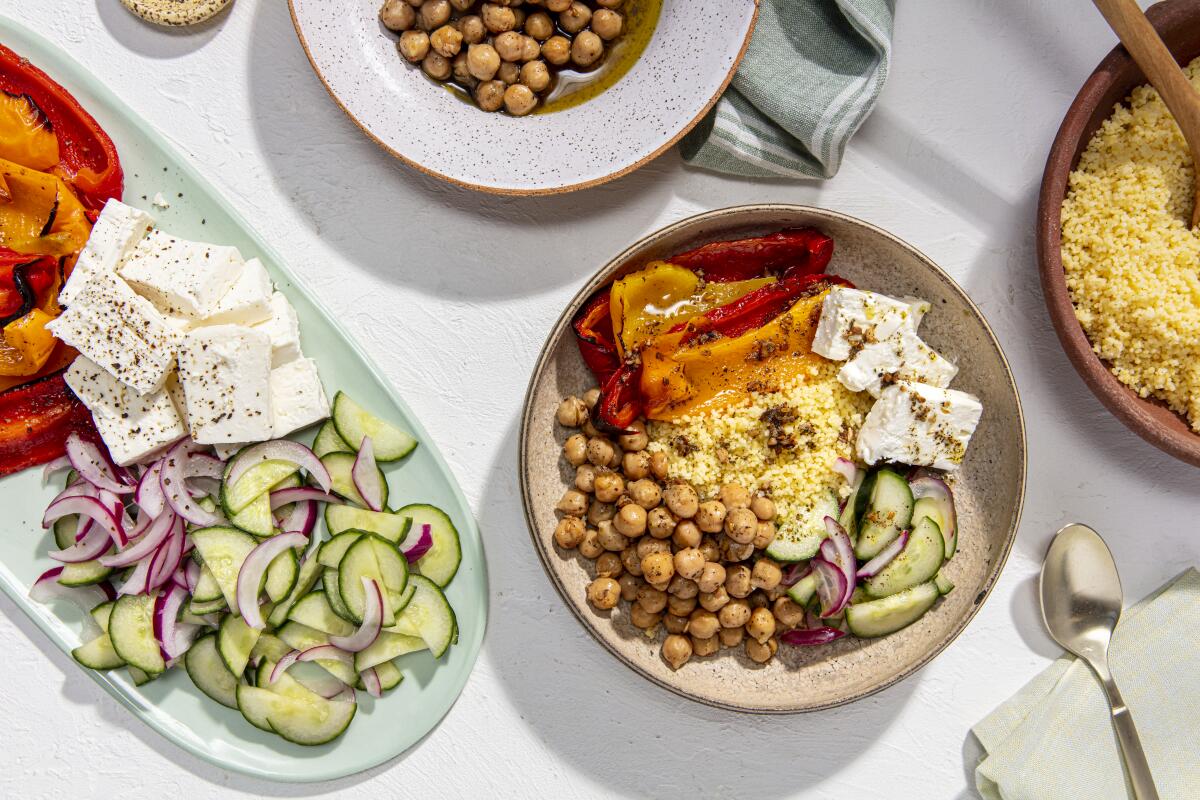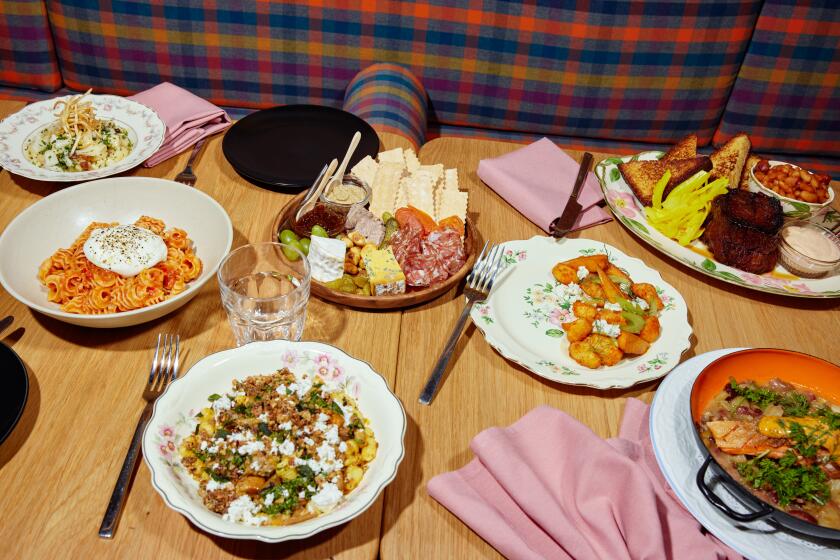Better than pizza delivery? Khachapuri to your door

- Share via
Later this month I’ll return to writing weekly reviews. It’s time.
On Tuesday restaurants will be permitted to fill their dining rooms again to normal capacity. Gov. Gavin Newsom announced last week that California will continue to allow restaurants and bars to serve alcoholic drinks in outdoor dining areas and in delivery and to-go forms through 2021.
The pandemic isn’t over, but as my colleagues Luke Money and Rong-Gong Lin II reported yesterday, “The state has for several months recorded one of the lowest coronavirus infection rates in the country, a distinction that’s endured despite the end of many restrictions and the rise of new variants.” More than 70% of adults in California have been given at least one dose of the COVID-19 vaccine.
Enjoying this newsletter? Consider subscribing to the Los Angeles Times
Your support helps us deliver the news that matters most. Become a subscriber.
Fully vaccinated for over a month, I’m back to eating in restaurants most nights. It’s jarring, jubilant, strange, familiar and mostly heartening. I’ve so missed hugging friends before and after dinner. I return home a little worn out from socializing, thinking about the restaurant staffs and the far greater extremes of exhaustion they’re surely feeling right now.
I’m also emerging from the catastrophe more attuned than ever to the cooking done outside traditional restaurant spaces — how vital pop-ups and social media-based microbusinesses have been for personal survival and creative incubation. The Food team has covered the surge of pop-ups abundantly — with lists of favorites, considerations of their place in our culture, their evolution as the world reopens — and I don’t see that changing. The vein yields too many rich stories to ignore.
Emily Efraimov has one of them. Last August she began her pop-up, Little Dacha, tracing and cooking the foods of her Russian and Circassian heritages. Her out-of-the-gate focus has been khachapuri, the soul-satisfying Georgian breads traditionally stuffed with cheese.
Efraimov makes a gorgeous Adjarulian khachapuri, with its famous tapered canoe shape and a molten center of salty cheese (in this case a mix of mozzarella and feta) and egg. She thinks beyond the usual parameters with two variations: wild mushrooms and caramelized onions with parmesan and herbs, and a showstopper of lamb seasoned with khmeli-suneli (the Georgian dried spice and herb blend that includes fenugreek, bay leaf and summer savory) smoothed with labneh and zinged with green chile pickle. Order a little gem salad with mint and basil on the side for lightness.

Eat your way across L.A.
Get our weekly Tasting Notes newsletter for reviews, news and more.
You may occasionally receive promotional content from the Los Angeles Times.
Also on the menu: frozen pork pierogi, which come with sour cream and sesame oil infused with dill, garlic and chile for garnishes; balls of labneh jarred in oil with herbs (great for smearing over toasted slices of the country bread she bakes); and a handful of desserts including sharlotka, an airy, crackly-domed apple cake.
Pre-pandemic, Efraimov worked in marketing during the day — she was in the marketing department of Bon Appétit before moving to Los Angeles nearly five years ago — and at night she cooked on the line at places like Animal and Hatchet Hall. When she lost her jobs last spring, she packed her car to the brim and traveled into the desert and then to northern California before returning to L.A. She’s lived in eight different places during the last 16 months, grounding herself by cooking and focusing on Little Dacha.
The word “dacha,” Efraimov told me in a recent conversation, comes from the Russian word “davat,” which broadly translates as “something to give.” They were summer homes once bequeathed by czars, often as retreats for writers and artists. During the Soviet era, Efraimov said, dachas played a vital role in subsistence — they were a haven to grow your own fruits and vegetables when food was scarce.
“Dacha is a cultural philosophy now,” she said, “rooted in nature, endurance, connection and an escapist sort of hospitality.”
The connective part is key in Efraimov’s cooking: She thinks about bridging her mother’s Moscow upbringing with her father’s rural childhood in the foothills of the Caucasus Mountains, and about the East-West culinary legacy of the Silk Roads that passed through Georgia. As she’s studying the history of Georgian cuisines, she’s experimenting with new dishes for Little Dacha: an array of zakuski (cured fish and meats and salads that make a substantial feast), a variation of stroganoff made with venison.
“It’s all I think about,” she says of her one-woman operation, for which she prepares the food and then delivers it. She hopes next for a residency somewhere — a regular slot setting up at a wine bar, perhaps, or taking over the kitchen at a restaurant on nights when the place would otherwise be closed.
I like the idea of tearing into one of Efraimov’s khachapuris on a patio somewhere with a glass of orange wine. In the meantime, I’ll happily keep eating them gently reheated straight out of a delivery box.
Have a question?
Other stories
— Speaking of pop-ups and transitions: I wrote this week about Ray Anthony Barrett, a chef who runs the pop-up and catering business Cinqué. His cooking career was taking off when the pandemic hit; the last year brought him to some unexpected detours. We talked about Juneteenth, what real autonomy and food security means and (to quote Joni Mitchell) the refuge of the road. Bonus: There are recipes (thank you, Ben Mims, for the help!) for Barrett’s mom’s Hoppin’ John and bissap, a Juneteenth red drink based on a Senegalese hibiscus drink.
On June 15 at 6 p.m., Barrett will be talking about Juneteenth with other chefs for a Food Bowl event hosted by Times staff writer Donovan X Ramsey. Check out all the upcoming 2021 Food Bowl dinners and events here.
— Ben brings us the third installment in the Week of Meals series with recipes from Dawn Perry, recipe developer and author of the forthcoming cookbook “Ready, Set, Cook.” Dishes include grilled swordfish with quick crushed potatoes and parsley-caper relish, pasta with garlic & chile greens and toasted bread crumbs and chickpea salad bowls with cucumbers, feta and za’atar.
— Jenn Harris writes about the fight to save Boulevard, the only gay bar in Pasadena. In that spirit, Susan Hornik rounds up some places to eat, drink and commune during Pride Month.
— Lucas Kwan Peterson wades into the allegations concerning Belcampo, the Oakland-based meat operation with its own Northern California farm and three L.A.-area locations. A former ex-employee posted video alleging the company has been misleading customers about the origins of some of the meat it sells. Hoping for more transparency than Belcampo has offered in the situation, Lucas asks, “What does farm-to-table mean, anyway, if you don’t know where the farm is?”

Eat your way across L.A.
Get our weekly Tasting Notes newsletter for reviews, news and more.
You may occasionally receive promotional content from the Los Angeles Times.



